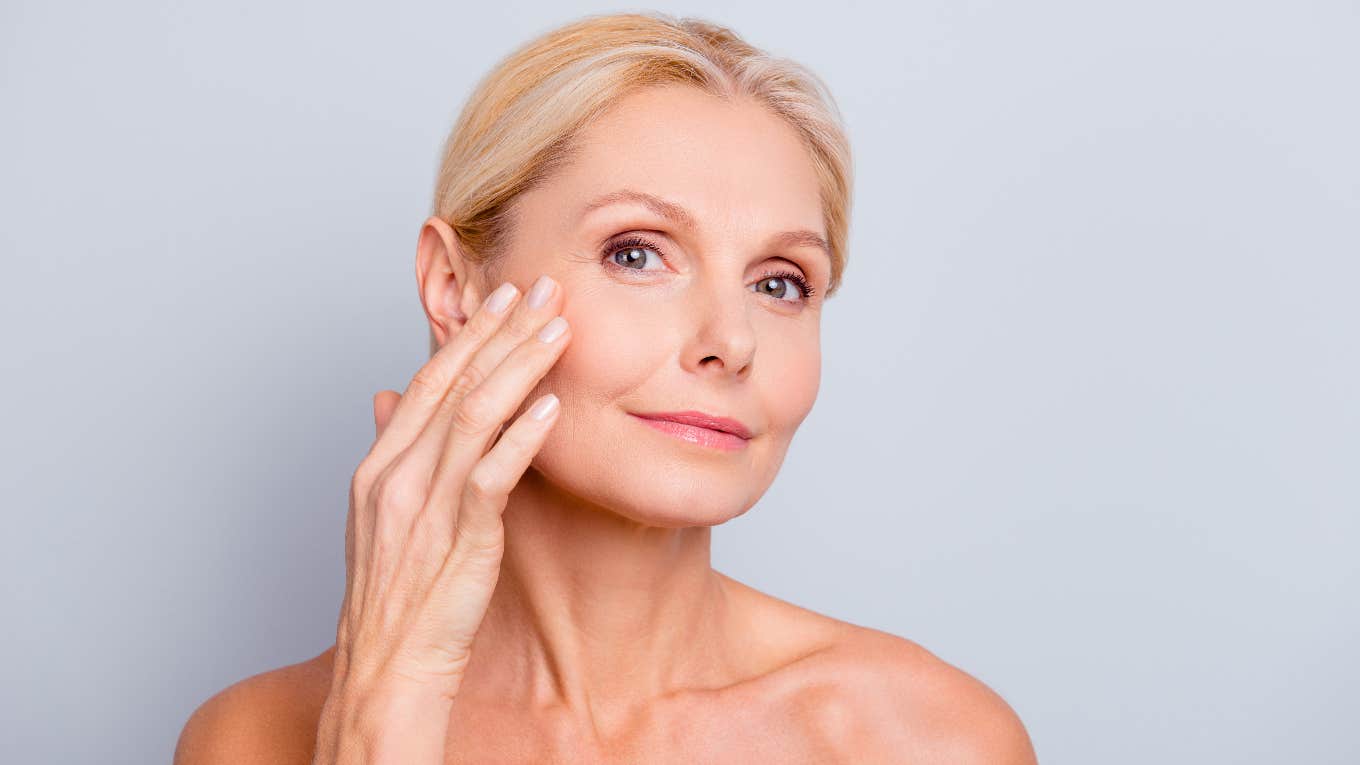Research Reveals The Two Specific Ages When People Start To Age Dramatically
Felt like you started rapidly aging, blowing out your 44th birthday candles? You're not alone.
 Roman Samborskyi | Shutterstock
Roman Samborskyi | Shutterstock Are you in your 40s or 60s and feel like all of a sudden you've gotten older overnight? Well, it turns out it's not just in your head — not entirely, anyway.
New research shows that we don't entirely get older in a slow, steady progression, but rather in two big, seemingly immediate shifts. The data has the potential to change the way doctors look at aging.
The study shows that people age dramatically at age 44 and again at 60.
If you ask a lot of older people, they'll often say their mid-40s was when they really started to "feel" the process of aging setting in. Some, like the mother of TikToker @kforreals in the video below, might even specifically cite 44 as the age when things suddenly seemed to shift.
But that's got to just be perception, right? After all, we are all "aging" from the moment we come into the world. Surely we can't actually "feel" aging kick in like a motor starting up in a car.
Well, it turns out we kind of can. A new study out of the Stanford University School of Medicine tracked people between the ages of 25 and 75 for periods ranging up to nearly seven years. What they found is the opposite of what we would typically expect.
Scientists found across all types of human molecules that aging is neither linear nor gradual.
The study looked at molecules in the bodies of the study's 108 subjects to track the ways they age and develop over time. Subjects submitted skin, oral, and nasal swabs as well as blood and stool samples every few months over periods ranging from one year to just shy of seven years.
Scientists observed some 135,000 different types of molecules and microbes, from RNA and proteins to bacteria and fungi living in various parts of the subjects' bodies. The vast majority of these molecules did not shift in any kind of orderly, chronological, or gradual fashion.
 Stock-Asso
Stock-Asso
Instead, they underwent massive changes at around the age of 44 — which scientists did not expect.
At first, they thought it was just the impacts of perimenopause and menopause in the female subjects skewing the data. But when they looked at findings from the men in the study, they found similar results.
That doesn't mean that perimenopause isn't a factor at all for women, just that it isn't the only factor resulting in this burst of aging around 44. The study's authors say that what exactly those factors are should be the subject of future research.
Scientists say these findings shed light on certain health problems and help us combat them.
That huge age-related changes occur in the 60s is not so surprising — seniors are known to be prone to certain health issues, and previous studies have revealed that another burst of aging happens in the late 70s, as well.
But what this study suggests, scientists say, is that the foundations for those later issues are being laid in the mid-40s. Most notably, the age 44 wave most impacted molecules related to cardiovascular disease and metabolization of things like fats and alcohol (so those horrific hangovers are no coincidence).
The burst of aging at 60, on the other hand, was more related to the immune system, carbohydrate metabolism, and the functions of the kidneys.
Stanford professor of genetics and senior author of the study Dr. Michael Snyder, PhD, said that while the exact causes of these shifts are yet to be discovered, the data means that the mid-40s and early 60s are key periods when people can and should focus on certain health behaviors to mitigate risk.
For instance, the scientists suggest increasing exercise and lowering alcohol consumption in your mid-40s to lessen the impact of the cardiovascular and alcohol-metabolism changes that occur at age 44.
“I’m a big believer that we should try to adjust our lifestyles while we’re still healthy,” Snyder said.
On social media, the study definitely resonated — especially among those in their mid-40s.
What most intrigued me about this study is that it directly relates to what I've experienced recently in my life but assumed was just in my head. I'll be turning 46 in December, and it seems like the past 18 months have been like something out of "The Picture of Dorian Grey."
I turned 44, and immediately, my energy decreased. I could tell my eyes and jowls were starting to sag in the basset-hound-like way that is common in my family. My metabolism changed dramatically, my enjoyment of alcohol basically disappeared, my sleep changed — even my friggin' EYEBROWS started growing longer. Everything seemed to transition overnight!
I assumed it was just my mid-life crisis making me hypersensitive — and as a person with the deeply ridiculous combination of hypochondria and constitutional fear of going to the doctor, I've also spent the past 18 months actively considering that I might actively be dying of some disease. (I've since gone to the doctor and am pleased to report that I am only dying spiritually, not physically.)
Then this study hit social media and I quickly noticed my experience is — thank God — not at all unique. As author Amber Sparks put it in a post on X, "Uh, as a 46-year-old, I can confirm — it happens like, overnight — one day your neck is fine, and the next day it’s a horror movie." Yep!
My boss, who's of a similar age, said she too suddenly felt an "overall crappier old lady feeling" set in "EXACTLY at 44," along with facial drooping that had her asking for the first time in her life, "am I the type of person who would do a facelift? MAYBE?" (Girl, same. Company outing to the "spa" next month? Hit my line and LMK when you're free.)
It's good to know, at least, that we're not all imagining things — and that, according to this study's authors, we can still do something about it that will pay off in the long run. Because as my 87-year-old aunt likes to say, "Aging ain't for sissies!"
John Sundholm is a news and entertainment writer who covers pop culture, social justice, and human interest topics.

